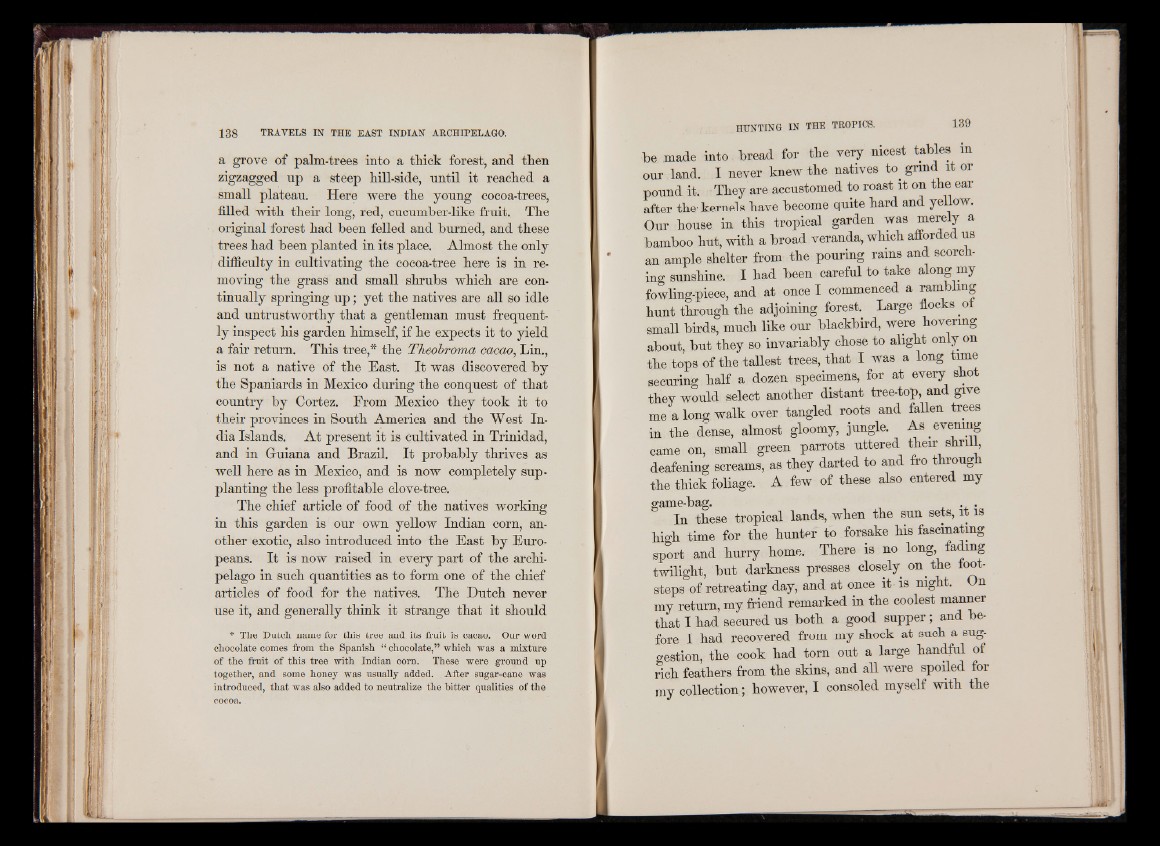
a grove of palm-trees into a thick forest, and then
zigzagged up a steep hill-side, until it reached a
small plateau. Here were the young cocoa-trees,
filled with their long, red, cucumber-like fruit. The
original forest had been felled and burned, and these
trees had been planted in its place. Almost the only
difficulty in cultivating the cocoa-tree here is in removing
the grass and small shrubs which are continually
springing u p ; yet the natives are all so idle
and untrustworthy that a gentleman must frequently
inspect his garden himself, if he expects it to yield
a fair return. This tree,* the Theobroma cacao, Lin.,
is not a native of the East. It was discovered by
the Spaniards in Mexico during the conquest of that
country by Cortez. From Mexico they took it to
their provinces in South America and the West India
Islands. At present it is cultivated in Trinidad,
and in Gruiana and Brazil. It probably thrives as
well here as in Mexico, and is now completely supplanting
the less profitable clove-tree.
The chief article of food of the natives working
in this garden is our own yellow Indian corn, another
exotic, also introduced into the East by Europeans.
It is now raised in every part of the archipelago
in such quantities as to form one of the chief
articles of food for the natives. The Dutch never
use it, and generally think it strange that it should
* The Dutch name for this tree and its fruit is cacao. Our word
chocolate comes from the Spanish “ chocolate,” which was a mixture
of the fruit of this tree with Indian corn. These were ground up
together, and some honey was usually added. After sugar-cane was
introduced, that was also added to neutralize the hitter qualities of the
cocoa.
be made into bread for the very nicest tables in
our land. I never knew the natives to grind it or
pound it. They are accustomed to roast it on the ear
after the-kernels have become quite hard and yellow.
Our house in this tropical garden was merely a
bamboo hut, with a broad veranda, which afforded us
an ample shelter from the pouring rains and scorching
sunshine. I had been careful to take along my
fowling-piece, and at once I commenced a rambling
hunt through the adjoining forest. Large flocks ot
small birds, much like our blackbird, were hovering
about, but they so invariably chose to alight only on
the tops of the tallest trees, that I was a long time
securing half a dozen specimens, for at every shot
they would select another distant tree-top, and give
me a long walk over tangled roots and fallen trees
in the dense, almost gloomy, jungle. As evening
came on, small green parrots uttered their shrill,
deafening screams, as they darted to and fro through
the thick foliage. A few of these also entered my
game-bag. . .
In these tropical lands, when the sun sets, it is
high time for the hunter to forsake his fascinating
sport and hurry home. There is no long, fading
twilight, but darkness presses closely on^ the footsteps
of retreating day, and at once it is night. On
my return, my friend remarked in the coolest manner
that I had secured us both a good supper; and before
I had recovered from my shock at such a suggestion,
the cook had torn out a large handful of
rich feathers from the skins, and all were spoiled for
my collection; however, I consoled myself with the